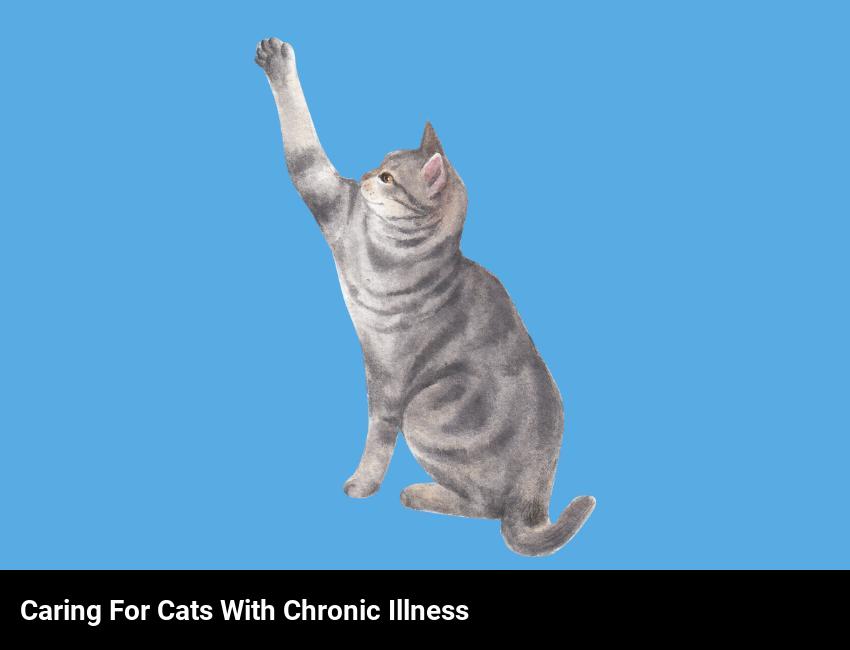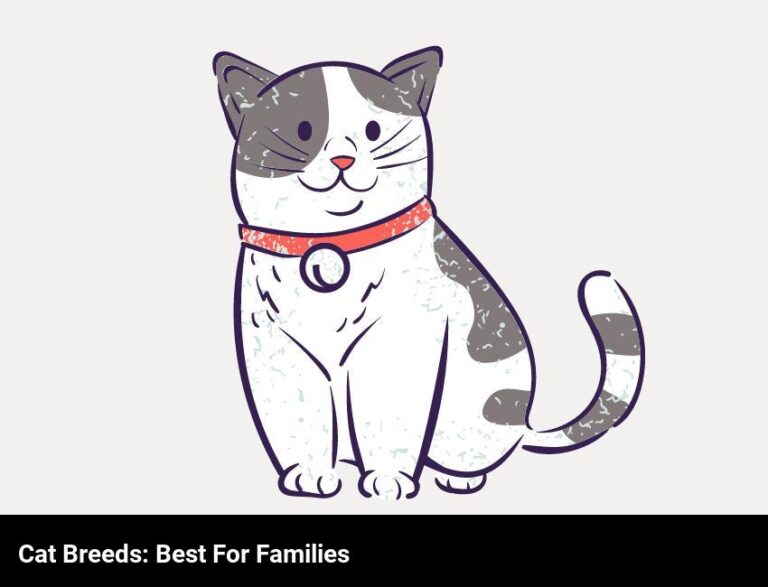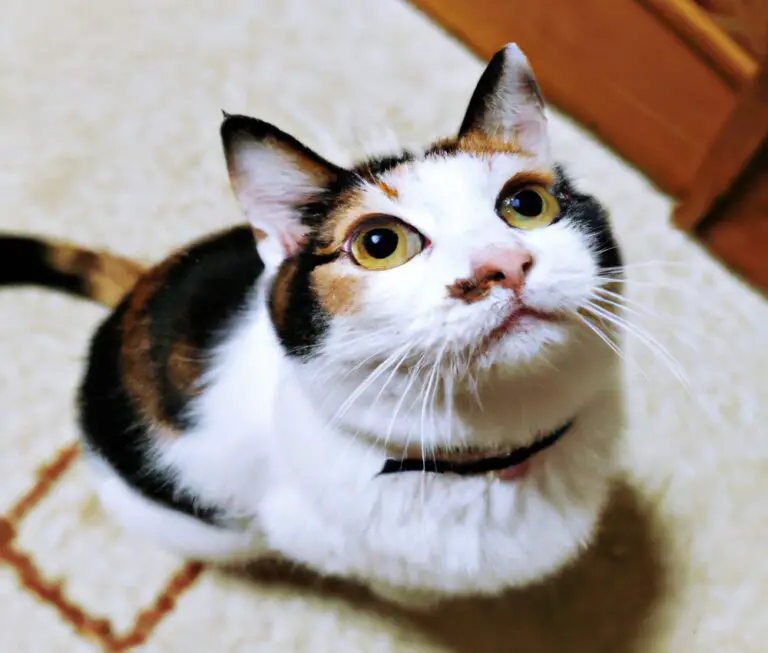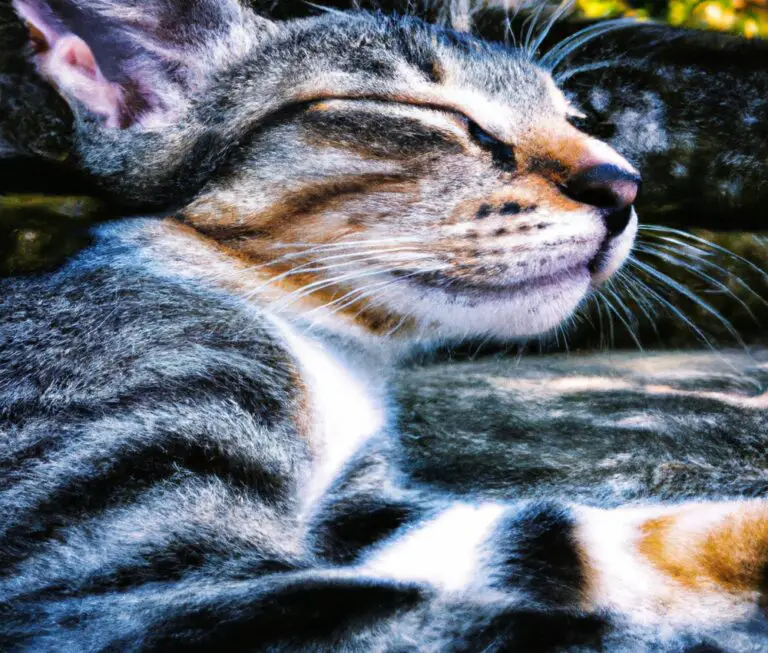Caring For A Cat With A Chronic Illness
Caring for a cat with a chronic illness can be a difficult challenge, but it is important to provide regular veterinary care and to manage the cat’s diet and lifestyle to keep them comfortable. It is also important to provide emotional support and ensure that the cat is not in any pain.
When I adopted my cat from the shelter, I had no idea she had a chronic illness. I quickly noticed her sleeping more than usual, and she had a hard time running and jumping like other cats. After taking her to the vet, I found out she had a chronic illness. I was determined to do whatever it took to make sure she was comfortable and still lived a happy life.
Through my own research and advice from the vet, I have learned a lot about caring for cats with chronic illnesses. I want to share my experience and knowledge with other pet owners to help them provide the best care for their cats. I will discuss the most common chronic illnesses cats suffer from, what symptoms could indicate a chronic illness, and the treatments available. I will also discuss the importance of creating a comfortable environment, and the best diet and exercise plan for your cat with a chronic illness. Finally, I will discuss the emotional and physical care needed to provide your cat with the best quality of life.
What are the most common chronic illnesses that cats suffer from?
Cats are resilient and can live long, healthy lives if they are given proper care. Unfortunately, cats are also prone to developing chronic illnesses, which can require constant monitoring and treatment. The most common chronic illnesses for cats include renal disease, diabetes, hyperthyroidism, inflammatory bowel disease, and cancer.
Renal disease, also known as chronic kidney disease (CKD), is a progressive disorder that affects cats of all ages. It usually begins with a decrease in kidney function, leading to symptoms such as increased thirst and urination, weight loss, and decreased appetite.
Diabetes is another common chronic illness in cats. It occurs when a cat’s body is unable to properly process sugar, leading to an increase in blood sugar levels. Symptoms of diabetes include increased thirst and urination, weight loss, and lethargy.
Hyperthyroidism is a condition in which a cat’s thyroid gland produces too much thyroid hormone. Symptoms of hyperthyroidism include increased appetite, weight loss, and restlessness.
Inflammatory bowel disease (IBD) is a common chronic illness that affects cats. It is caused by inflammation of the intestines, leading to symptoms such as vomiting, diarrhea, and poor appetite.
Finally, cancer is a serious chronic illness that can affect cats. The most common types of cancer in cats include lymphoma, leukemia, and skin cancer. Symptoms of cancer can vary depending on the type and location of the cancer, but may include weight loss, lethargy, and a change in appetite.
It is important to keep an eye out for signs of chronic illnesses in cats and to take your cat to the vet for regular check-ups. With the proper care, cats can still lead long and healthy lives, even if they suffer from a chronic illness.
What kind of symptoms can indicate that a cat may be suffering from a chronic illness?
As a cat parent, you want nothing more than to ensure that your beloved pet is healthy and happy. But, if your cat is suffering from a chronic illness, they may not always show obvious symptoms. That’s why it’s important to be aware of the signs of a chronic illness in cats.
The most common symptoms of a chronic illness in cats include: decreased appetite, frequent urinary accidents in the house, excessive vocalization, weight loss, and changes in activity level. If your cat is displaying any of these symptoms, it’s important to take them to the vet for a checkup.
It’s also important to look for any changes in behavior that could indicate a chronic illness. For example, if your cat is normally social, but suddenly becomes withdrawn and uninterested in activities they used to enjoy, this could be a sign that something is wrong. In addition, if your cat is sleeping more than usual, or if they seem to be in pain or uncomfortable, this could indicate a chronic illness.
It’s also important to look out for any changes in grooming habits. Cats that are healthy and happy will typically groom themselves regularly; if your cat is no longer grooming themselves, this could be a sign that they are suffering from a chronic illness and need medical attention.
Finally, if you notice any changes in your cat’s coat or skin, it’s important to have them checked out by a vet. Changes in coat or skin can indicate internal problems, such as a chronic illness.
Being aware of the signs of a chronic illness in cats is the best way to ensure that your beloved pet stays healthy and happy. If you notice any of the symptoms listed above, or any changes in your cat’s behavior, contact your vet for a checkup.
How can you help a cat with a chronic illness?
Caring for a cat with a chronic illness can be a challenging task, but there are several ways you can help. Firstly, it’s important to understand your cat’s condition and how it affects them, so you can support them as best you can. Talk to your vet and get as much information as you can.
Secondly, maintain a consistent and healthy routine for your cat. Regular meals, daily grooming, and plenty of playtime can help them stay active and content. Make sure to monitor your cat’s eating habits and activity levels to ensure they’re getting the care they need.
Thirdly, ensure your cat has comfortable places to rest. You may need to purchase special bedding or blankets to keep them comfortable. Cats with chronic illnesses may need extra naps and sleep, so provide them with plenty of cushy spots to relax in.
Finally, it’s essential to provide your cat with emotional support. Spend quality time with them, pet them, and talk to them. Let them know that you’re there for them and that you’re willing to do whatever it takes to make them happy.
Caring for a cat with a chronic illness can be a daunting task, but it doesn’t have to be. With understanding, consistency, and a little extra care, you can help make life a little easier for your feline friend.
What can you do to make sure your cat’s environment is comfortable and stress-free?
If you have a cat with a chronic illness, you can ensure that their environment is comfortable and stress-free by taking some simple steps.
First, make sure your cat has access to a variety of places to relax. Cats love having options, so provide them with beds, a sunny window sill, and even snuggly blankets or pillows in which to curl up.
You’ll also want to make sure your cat has plenty of toys and activities to keep them entertained. Cats can get bored easily, so offer them a variety of toys and rotate them to keep your cat from getting too used to any one of them.
If your cat is on medication, make sure to provide a safe place for them to take it. Make sure that there are no other pets in the area who could interfere with the medication or the cat’s comfort.
Finally, make sure to provide plenty of cuddles and love for your cat. Cats are social creatures and thrive on human interaction. Give your cat lots of attention, petting, and playtime to ensure that they stay happy and relaxed.
By taking these simple steps, you can help make sure that your cat’s environment is comfortable and stress-free despite their chronic illness.
How can you create a regular routine for your cat to help manage their chronic illness?
Creating a regular routine for your cat can go a long way in helping to manage their chronic illness. Here are some tips to get you started:
Set a specific feeding schedule. This will make sure your cat has consistent access to food during the day and will help keep their energy levels and weight stable. Make sure you’re giving them the right kind of food for their specific needs.
Create a designated area for your cat to rest and relax. This could be a special corner of the house, a cat bed, or even a pet carrier. This will help them stay comfortable and will help them adjust to their new routine.
Set aside time for regular play. This is a great way to keep your cat physically active and mentally stimulated. Make sure to set aside at least half an hour each day for playtime.
Set up a regular veterinary appointment. Make sure you’re taking your cat to the vet at least once a month for check-ups and to monitor their condition.
Make sure your cat is getting plenty of attention and love. Cats with chronic illnesses can sometimes feel neglected or left out. Make sure to give them plenty of love and cuddles and make them feel like they’re an important part of the family.
Creating a regular routine for your cat can help manage their chronic illness and improve their quality of life. Keep these tips in mind and you can create an easy and effective routine for your cat.
What diet and exercise plan should you create for a cat with a chronic illness?
If you have a cat with a chronic illness, it’s important to create a diet and exercise plan tailored to your cat’s needs. The plan should support your cat’s health and help manage their chronic condition.
Your cat’s diet should be designed to meet their nutritional needs, so it’s best to consult your vet for advice. Your vet can help you identify any foods your cat may need to avoid, such as those high in fat, carbohydrates, or sodium. They can also recommend foods that are specifically designed for cats with chronic illnesses.
When it comes to exercise, it’s important to take your cat’s age, breed, and condition into consideration. Younger cats may need more exercise than older cats. Also, some breeds of cats may require more exercise than others. If your cat has a chronic illness, it’s important to make sure they get enough exercise, but not too much. Your vet can help you create a plan tailored to your cat’s specific needs.
It’s also important to consider your cat’s lifestyle when creating their diet and exercise plan. If your cat is an indoor cat, they may need more exercise than if they were an outdoor cat. Also, if your cat spends a lot of time outside, you may need to make sure their diet contains more nutrients than if they were an indoor cat.
Creating a diet and exercise plan for a cat with a chronic illness is an important part of their care. By consulting your vet and considering your cat’s lifestyle, you can make sure your cat is getting the nutrients and exercise they need to stay healthy.
What are some of the treatments available for cats with chronic illnesses?
If your cat has been diagnosed with a chronic illness, it’s important to take steps to ensure they get the best treatment possible. Fortunately, there are many treatments available for cats with chronic illnesses.
One of the most common treatments is medication to help with symptom management. Depending on your cat’s individual needs, your vet may recommend prescription medications, over-the-counter medications, or a combination of both. Additionally, you may need to give your cat supplements to help support their health.
Another option available to cats with chronic illnesses is dietary management. Your vet may recommend a specific type of food to help manage symptoms. For example, some cats with chronic illnesses may benefit from a low-protein diet. Other cats may need more fiber or additional vitamins and minerals in their diet.
Depending on your cat’s condition, your vet may also suggest lifestyle changes. For example, if your cat has arthritis, your vet may suggest modifications to your home to make it easier for your cat to move around. Additionally, your vet may recommend regular light exercise to help manage symptoms and prevent further deterioration of your cat’s condition.
Finally, some cats with chronic illnesses may benefit from holistic treatments such as acupuncture, massage, and natural supplements. These treatments can help to reduce stress and provide pain relief for cats with chronic illnesses.
These are just some of the treatments available for cats with chronic illnesses. With the right combination of treatments, you can help your cat manage their condition and maintain a good quality of life.
How can you best care for your cat with a chronic illness emotionally and physically?
Taking care of a cat with a chronic illness is a challenging and rewarding experience. You can make a big difference in their life by providing both physical and emotional care.
First and foremost, make sure you are getting regular veterinary care for your cat. This could mean regular check-ups or more specialized treatment. Keeping up with your cat’s medical needs will help them remain comfortable and will also help you stay informed of any changes in their condition.
In addition to providing physical care, it’s important to give your cat emotional support. Spend quality time together, talk to them, and provide plenty of attention. Make sure you are providing a safe and comfortable environment for them, as cats with chronic illness may not be able to move around as much or may need a special place to rest.
It’s also important to be patient with your cat. Your cat may not be able to do things they used to do, and that can be difficult for both of you. Try to understand their limitations, and don’t push them too hard.
Finally, remember to show your cat love and affection. Cats with chronic illnesses need extra special care, and your love and attention will make all the difference.

Frequently Asked Questions
Are there any dietary changes i should make when caring for a cat with a chronic illness?
Yes, it is important to make dietary changes when caring for a cat with a chronic illness. Your veterinarian can help you determine the best diet for your cat based on their specific condition. You may need to switch to a veterinary-prescribed or therapeutic diet that is designed to meet the needs of cats with chronic illnesses. It may also be beneficial to provide your cat with supplements to help them stay healthy.
Is there an increased risk of infection when caring for a cat with a chronic illness?
Yes, there is an increased risk of infection when caring for a cat with a chronic illness. It is important to take extra precautions when handling them and their litter box, to avoid potential exposure to germs. Wearing gloves, washing your hands and changing your clothes after contact can help reduce the risk of infection.
Are there any lifestyle changes i should make when caring for a cat with a chronic illness?
Yes, there are several lifestyle changes you should make when caring for a cat with a chronic illness. It is important to provide a consistent routine and to give the cat plenty of love and attention. You should also monitor the cat’s diet and exercise, and be aware of any changes in behavior or health. Additionally, it is important to keep up with any prescribed treatments, such as medications and vet visits. Finally, be prepared for any financial costs that come with caring for a cat with a chronic illness.
Is there anything i can do to reduce my cat’s stress levels when it has a chronic illness?
Yes, there are many things you can do to reduce your cat’s stress levels when it has a chronic illness. Providing a comfortable and stress-free environment is key. Make sure to keep the litter box clean, provide your cat with a safe and cozy bed, and provide plenty of toys and enrichment activities. You should also limit visitors to reduce stress and make sure to give your cat plenty of love and attention. Finally, talk to your veterinarian to learn more about how to best care for your cat.
What are the long-term effects of caring for a cat with a chronic illness?
Caring for a cat with a chronic illness can be both mentally and physically taxing. In the long term, this can lead to increased stress levels, exhaustion, and difficulty managing other tasks. It can also take a toll on relationships if the cat-owner does not receive enough support. It is important to take regular breaks and seek help when needed to avoid burnout.







